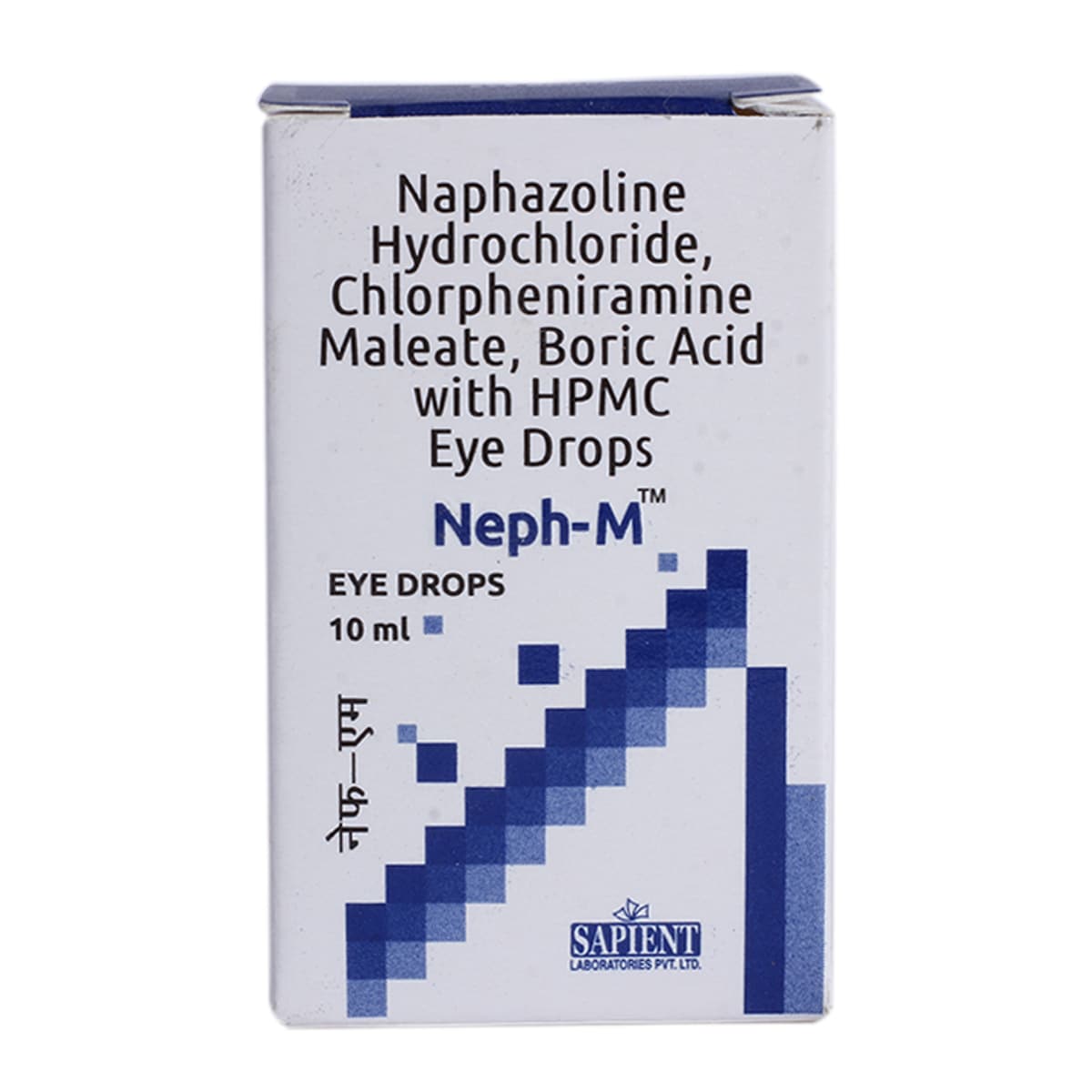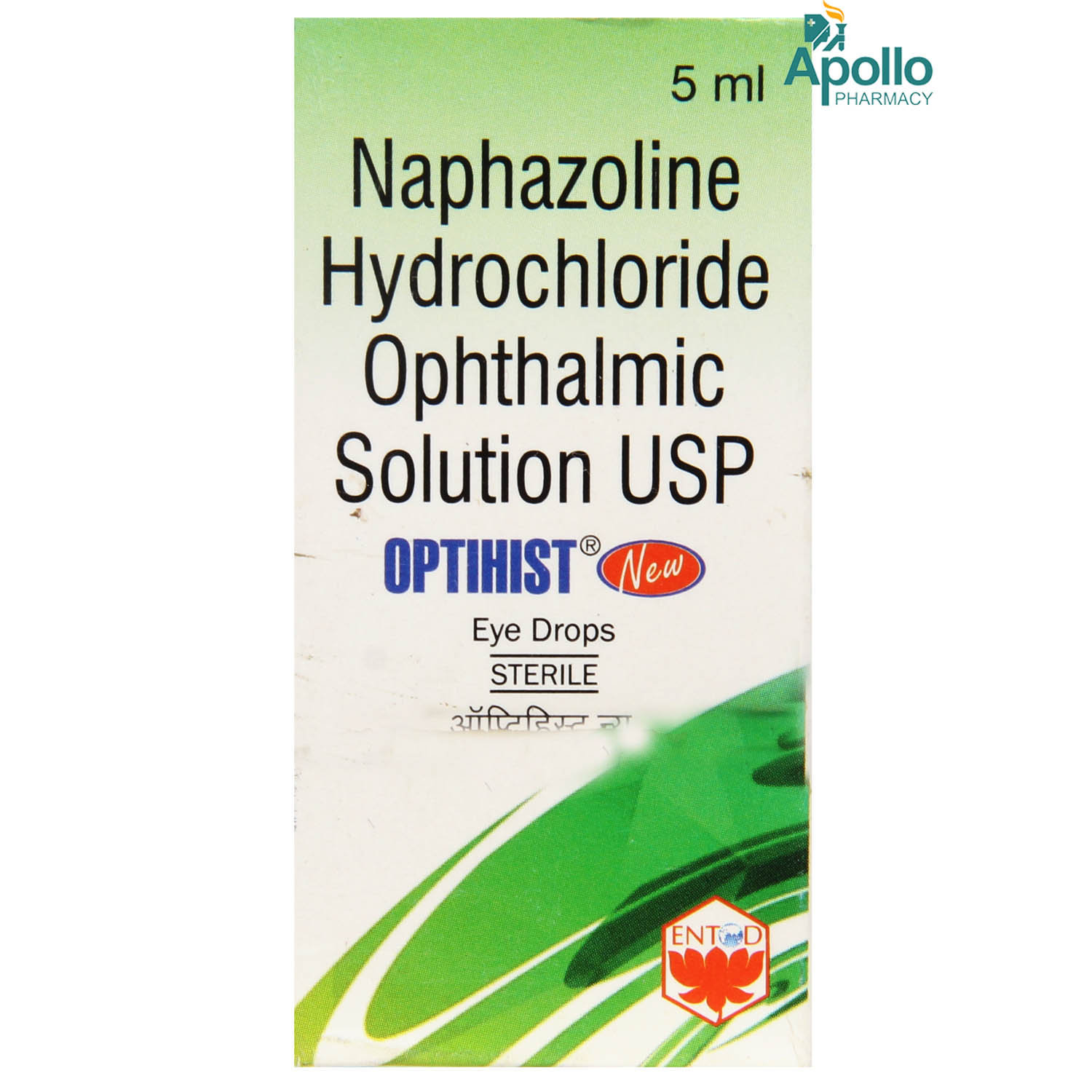Boric Acid+naphazoline
About Boric Acid+naphazoline
Boric Acid+naphazoline belongs to the class of medications called ‘Ophthalmologic agents’ used in the treatment of allergic conjunctivitis (eye infection) and computer vision syndrome. Allergic conjunctivitis is the inflammation of the conjunctiva (lining of the eye) due to exposure to allergens such as pollen and mold spores. Computer vision syndrome is a group of eye problems that occur due to prolonged use of a computer or digital devices.
Boric Acid+naphazoline contains boric acid and naphazoline. Boric acid has mild antimicrobial properties and acts against bacterial and fungal infections. It provides soothing relief from eye irritation and removes pollutants from the eye. Naphazoline is a vasoconstrictor that works by constricting or narrowing the eye's blood vessels, thus providing relief from redness, swelling, and irritation.
You should use this medicine exactly as prescribed by the doctor. The common side-effects of Boric Acid+naphazoline are redness, irritation, and blurred vision at the application site. These side effects are usually mild and temporary. However, if any of these side effects persist or get worse, inform your doctor immediately.
It is not recommended to take Boric Acid+naphazoline if you are allergic to any contents of it. Before taking Boric Acid+naphazoline, inform your doctor if you have glaucoma (increased pressure inside the eye), hypertension (high blood pressure), heart disease, hyperthyroidism (overactive thyroid), diabetes, an eye infection, or injury and have been taking monoamine oxidase inhibitors. Boric Acid+naphazoline should be used with caution in pregnant women, breastfeeding mothers, and elderly people. Boric Acid+naphazoline may not interact with alcohol. Boric Acid+naphazoline may cause temporary blurred vision, so do not drive or operate heavy machinery if your vision is not clear.
Uses of Boric Acid+naphazoline
Medicinal Benefits
Boric Acid+naphazoline is used to treat allergic conjunctivitis and computer vision syndrome. It has antimicrobial and vasoconstrictor (narrows blood vessels) properties. It provides relief from the symptoms such as itching, irritation, watery eyes, redness and swelling. It should be taken as prescribed by the doctor for the best results.
Directions for Use
Storage
Side Effects of Boric Acid+naphazoline
- Redness
- Eye irritation
- Blurred vision (temporary)
Drug Warnings
Boric Acid+naphazoline is for eye use only. Do not use this medicine in the mouth, nose, or ears. Do not use it when you are wearing contact lenses as an ingredient (preservative) present in this medicine may cause discolouration of the lenses. So, it is advised to wait at least 15 minutes after instilling Boric Acid+naphazoline and wear contact lenses. Inform your doctor immediately if you notice any vision changes or your condition gets worse within 24 hours after using Boric Acid+naphazoline.
Drug Interactions
Drug-Drug Interactions: Boric Acid+naphazoline should not be used in combination with monoamine oxidase (MAO) inhibitors (isocarboxazid, phenelzine, rasagiline, selegiline, tranylcypromine) and eye lubricant (polyvinyl alcohol).
Drug-Food Interactions: No interactions found.
Drug-Disease Interactions: Boric Acid+naphazoline should be used with caution in patients with glaucoma (increased pressure inside the eye), hypertension (high blood pressure), heart disease, hyperthyroidism (overactive thyroid), diabetes and eye infection or injury.
Drug-Drug Interactions Checker List:
Safety Advice

Alcohol
cautionIt is not known whetherBoric Acid+naphazoline can interact with alcohol. Please consult your doctor.

Pregnancy
cautionIt is not known whether Boric Acid+naphazoline can cause harm to the unborn baby when used in pregnant women. So, please consult your doctor for further advice.

Breast Feeding
cautionIt is not known whether Boric Acid+naphazoline can cause harm to the nursing baby when used in breastfeeding women. So, please consult your doctor for further advice.

Driving
cautionBoric Acid+naphazoline may cause blurred vision temporarily after instilling eye drops. So, do not drive or operate heavy machinery until your vision is clear.

Liver
safe if prescribedBoric Acid+naphazoline is probably safe when used in patients with kidney diseases.

Kidney
safe if prescribedBoric Acid+naphazoline is probably safe when used in patients with kidney diseases.

Children
unsafeBoric Acid+naphazoline should not be used in children under 12 years as safety and efficacy have not been established.
Habit Forming
Diet & Lifestyle Advise
- Wash your hands regularly. Avoid touching the eyes with dirty hands.
- Avoid rubbing the eyes.
- Avoid sharing eye-makeup such as eyeliner, mascara or kohl.
- Always use clean towels or tissues to wipe your eyes and face.
- Regularly wash and change the pillow-cases.
- Clean and replace contact lens more often. Never share contact lens. Always remember to wash your hands before inserting and after removing the contact lens.
- Avoid staring at the digital screens for longer durations. Rest your eyes for every 20minutes.
- Blink regularly as it helps spread hydrating substances such as mucus and tears across the eyes.
Special Advise
- Wait at least 15 min before using any eye drops or ointment in the eye, after using Boric Acid+naphazoline eye drops.
- Do not stop taking Boric Acid+naphazoline without discussing it with your doctor, even if your symptoms improve.
- Inform your doctor if you do not see any symptomatic relief after 48 hours of therapy.
Patients Concern
Disease/Condition Glossary
Allergic conjunctivitis: Also known as eye allergy is the immune response that occurs when the eye comes in contact with an irritating substance known as an allergen. Allergens include dust, smoke, dander, mold or pollen. Eye allergy symptoms include itching, burning sensation, watery eyes, red/pink eyes, scaling around the eyes, and swollen or puffy eyelids.
Computer vision syndrome: Computer vision syndrome, also known as digital eye-strain, is the vision-related problems that occur due to prolonged computer, tablet, and mobile use. Symptoms include blurry vision, dry eyes, eye strain, headache, shoulder and neck pain.
FAQs
Boric Acid+naphazoline contains boric acid and naphazoline. Boric acid has mild antimicrobial properties and acts against bacterial and fungal infections. It provides soothing relief from eye irritation and removes pollutants from the eye. Naphazoline is a vasoconstrictor that works by constricting or narrowing the eye's blood vessels, thus providing relief from redness, swelling and irritation.
The common side-effects of Boric Acid+naphazoline are redness, irritation and blurred vision at the application site. These side-effects are usually mild and temporary. However, if any of these side-effects persist or get worse, inform your doctor immediately.
The preservative present in Boric Acid+naphazoline may interact with lenses and cause its discolouration. So, you should wait for at least 15 minutes to wear contact lenses after instilling Boric Acid+naphazoline eye drops.
Do not use other eye drops or ointments without consulting your doctor. However, if prescribed, it is advised to maintain an interval of at least 15 minutes after taking Boric Acid+naphazoline eye drops and before using other eye drops or ointment.
Boric Acid+naphazoline may alter blood sugar levels. So, it is necessary to let your doctor know that you have diabetes before taking this medicine.





